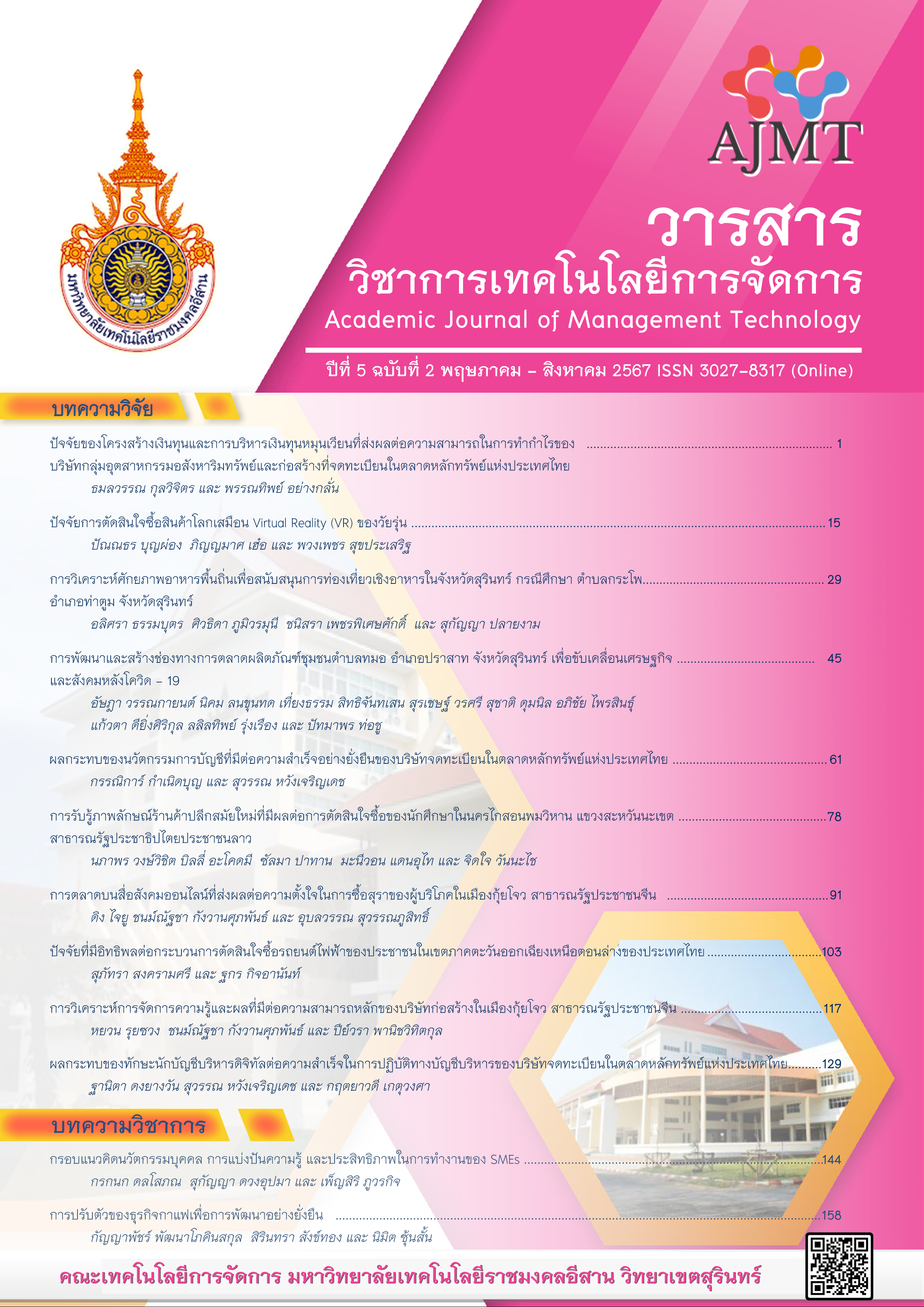ปัจจัยการตัดสินใจซื้อสินค้าโลกเสมือน Virtual Reality (VR) ของวัยรุ่น
DOI:
https://doi.org/10.14456/ajmt.2024.11คำสำคัญ:
การรับรู้, การตัดสินใจซื้อ, ความตั้งใจ, โลกเสมือน, ส่วนประสมทางการตลาดบทคัดย่อ
การศึกษาครั้งนี้เป็นการศึกษาปัจจัยการตัดสินใจซื้อสินค้าโลกเสมือน Virtual Reality ของวัยรุ่น การศึกษาครั้งนี้มีวัตถุประสงค์คือ 1) เพื่อศึกษาปัจจัยส่วนประสมการตลาดที่ส่งผลต่อกระบวนการตัดสินใจซื้อสินค้าโลกเสมือนVirtual Reality ของวัยรุ่น 2) เพื่อศึกษาความตั้งใจในการตัดสินใจซื้อสินค้าโลกเสมือน Virtual Reality ของวัยรุ่น และ 3) เพื่อศึกษาการรับรู้เกี่ยวกับการตัดสินใจซื้อสินค้าโลกเสมือน Virtual Reality ของวัยรุ่น เป็นการวิจัยเชิงปริมาณ เครื่องมือที่ใช้ในการรวบรวมข้อมูลเป็นแบบสอบถาม เก็บข้อมูลจากกลุ่มตัวอย่าง จำนวน 400 คน สถิติที่ใช้วิเคราะห์ได้แก่ ร้อยละ ค่าเฉลี่ย ค่าเบี่ยงเบนมาตรฐาน และสถิติทดสอบการวิเคราะห์การถดถอยพหุคูณ ผลการศึกษาพบว่า ปัจจัยส่วนประสมทางการตลาด ผู้ตอบแบบสอบถามมีความคิดเห็นอยู่ในระดับมาก ปัจจัยด้านความตั้งใจที่ส่งผลต่อกระบวนการตัดสินใจซื้อ ผู้ตอบแบบสอบถามมีความคิดเห็นอยู่ในระดับมาก ปัจจัยการรับรู้ที่ส่งผลต่อกระบวนการตัดสินใจซื้อผู้ตอบแบบสอบถาม มีความคิดเห็นอยู่ในระดับมาก ผลการทดสอบสมมุติฐานด้านการรับรู้ที่ส่งผลต่อกระบวนการตัดสินใจซื้อโลกเสมือน Virtual Reality ส่งผลต่อการตัดสินใจซื้อสินค้า ผู้ประกอบการสามารถนำวิจัยนี้ไปพัฒนาในส่วนประสมทางการตลาด ช่องทางจำหน่ายผ่านทางสื่อสังคมออนไลน์ให้หลากหลายและเข้าถึงลูกค้า ปัจจัยความตั้งใจที่ส่งผลต่อกระบวนการตัดสินใจซื้อสินค้าโลกเสมือน Virtual Reality ผู้ประกอบการสามารถนำไปพัฒนาสินค้าโลกเสมือนให้มีความดึงดูดหน้าสนใจ การวิจัยครั้งนี้ ในส่วนของปัจจัยการรับรู้ ด้านการรับรู้และรู้สึกผู้ประกอบการควรมุ่งเน้นในเรื่องการออกแบบให้ตรงความต้องการของลูกค้ารวมถึงฉากวิวทิวทัศน์ในโลกเสมือนที่ไม่เป็นไปตามความรู้สึกของผู้ใช้งาน
เอกสารอ้างอิง
Bleize, D. N. & Antheunis, M. L. (2019). Factors influencing purchase intent in virtual worlds. https://psycnet.apa.org/record /201918448-004
Chokchaiwong, K. (2022). Behavioral factors affecting the decision to invest in digital currency. (Cryptocurrency) of Thai people. https://archive.cm.mahidol.ac.th/bitstream/123456789/4423/1/TP%20BM.009%202565.pdf
Cochran, W. G. (1997). Sampling techniques (3th ed.). John Wiley&sons
Goldsmith, R. (1999). The personalised marketplace: Beyond the 4Ps. https://www.researchgate.net/publication/235287457_The_personalised_marketplace_Beyond_the_4Ps
Kardes, F. R., Cronley. M. L., & Cline, T. W. (2011). Consumer behavior. South-Western Cengage Learning.
Khunaneksin, N. (2018). Experiential marketing with virtual reality technology for customer condominium purchase intention [Master’s thesis, National Institute of Development Administration]. NIDA Repository. https://repository.nida.ac.th/handle/662723737/5060
Lee, M., Sandler, D. & Shani, D. (1997). Attitudeal constructs towards sponsorhip: Scale development using three global sporting events. International Marketing Review, 14(3), 159-169.
Mol Online. (2022). Top 12 metaverse brands selling their products digitally. https://metamandrill.com/metaverse-brands/.
Nilnoi, S. (2022). Factors affecting the intention to purchase virtual products in online mobile games during COVID-19 among young mass audience groups. http://digital_collect.lib.buu.ac.th/research/2563_232.pdf
Oobom, S. (2021). COVID-19 is driving us into the Metaverse world. https://ipg-connect.com/th/covid-19-drives-us-to-metaverse/
Rungruangjit, W. (2019). The role of influence with a seamless shopping experience and perception of consistency that affects product purchase satisfaction. https://so03.tcithaijo.org/index.php/JIRGS/article/view/243642
Schiffman & Kanuk. (2010). Consumer behavior (10th ed.). Pearson Prentice Hall.
Srisawatsakul, C. & Boontarig, W. (2023). A pilot study on the development of an immersive virtual reality map for the Mahawanaram Temple in Ubon Ratchatani, Thailand. Academic Journal of Management Technology, 4(2), 110-123. https://so03.tcithaijo.org/index.php/jomt/issue/download/17592/4846
Sukato, N. (2017). Principle marketing. Pearson Education Indochina Company Limited.
Sukkam, C. (2017). Factors affecting online shopping decision behavior of consumers in Muang district, Nakhon fathom. http://ithesis-ir.su.ac.th/dspace/handle/123456789/1693
Sukkam, C. (2017). Factors affecting the decision-making behavior of purchasing products through online media consumers in Mueang District, Nakhon Pathom Province. http://ithesisir.su.ac.th/dspace/bitstream/123456789/1693/1/59602308.pdf
Tilokawichai, W. & Sermsap, A. (2020). Factors affecting the decision to purchase used cards virtual media technology. https://so02.tcithaijo.org/index.php/mbs/article/view/239941/165478
Tilokavichai, V. & Surmsub, A. (2020). Factors influencing purchase decision augmented reality card. https://so02.tci thaijo.org/index.php/mbs/article/view/239941/165478
Thananchai, S. & Chatprasert, D. (2018). Lifestyle that affects attitude and the decision-making process for purchasing virtual products. https://so03.tci-thaijo.org/index.php/jprad/article/view/134264
Tuksan, P. (2017). Principle marketing. Rajamangala University of Technology Lanna Tak.
Warasarai, P. (2022). Factors affecting satisfaction in purchasing artwork in the form of NFT through online platforms in Thailand. https://archive.cm.mahidol.ac.th/handle/123456789/4543
Wongchan, D. & Kraiwanich, T. (2019). Factors for decision making an online purchase of Dzens. https://so04.tci thaijo.org/index.php/JLPRU/article/view/230975
Workplace. (2022) The future of VR - Top trends for 2023. https://th-th.workplace.com/blog/the-future-of-vr
Yotcharoen, K. (2016). The relationship between the marketing communication mix and brand equity, ready-to-drink green tea drinks in Khlong Luang Municipality Khlong Luang District Pathum Thani Province. Valaya Along Korn Rajabhat University.
ดาวน์โหลด
เผยแพร่แล้ว
รูปแบบการอ้างอิง
ฉบับ
ประเภทบทความ
สัญญาอนุญาต
ลิขสิทธิ์ (c) 2024 คณะเทคโนโลยีการจัดการ มหาวิทยาลัยเทคโนโลยีราชมงคลอีสาน วิทยาเขตสุรินทร์

อนุญาตภายใต้เงื่อนไข Creative Commons Attribution-NonCommercial-NoDerivatives 4.0 International License.
บทความที่ได้รับการตีพิมพ์เป็นลิขสิทธิ์ของคณะเทคโนโลยีการจัดการ มหาวิทยาลัยเทคโนโลยีราชมงคลอีสาน วิทยาเขตสุรินทร์
ข้อความที่ปรากฏในบทความแต่ละเรื่องในวารสารวิชาการเล่มนี้ เป็นความคิดเห็นส่วนตัวของผู้เขียนแต่ละท่านไม่เกี่ยวข้องกับคณะเทคโนโลยีการจัดการ มหาวิทยาลัยเทคโนโลยีราชมงคลอีสาน วิทยาเขตสุรินทร์ และคณาจารย์ท่านอื่นๆในมหาวิทยาลัยฯ แต่อย่างใด ความรับผิดชอบองค์ประกอบทั้งหมดของบทความแต่ละเรื่องเป็นของผู้เขียนแต่ละท่าน หากมีความผิดพลาดใดๆ ผู้เขียนแต่ละท่านจะรับผิดชอบบทความของตนเองแต่ผู้เดียว










